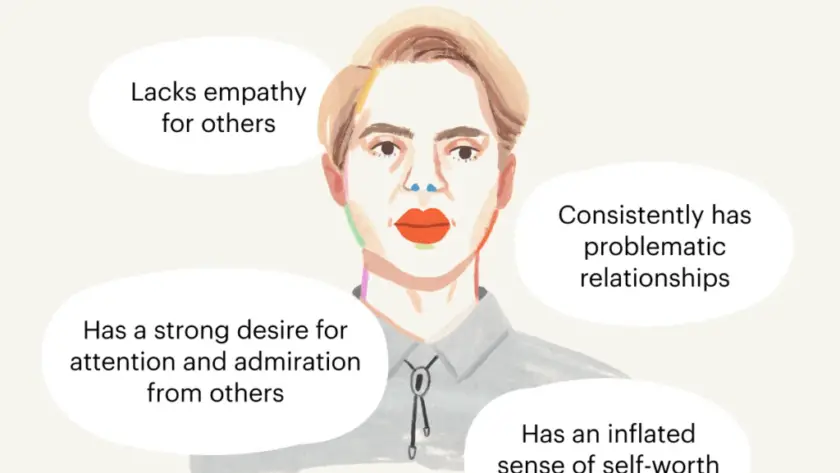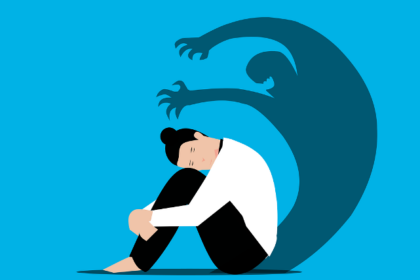In the intricate dance of human relationships, encountering individuals with narcissist traits can be a challenging and perplexing experience. Whether it’s a colleague, a friend, a family member, or a romantic partner, recognizing the signs of narcissism early on is crucial for maintaining emotional well-being and establishing healthier connections.
In this insightful article, we turn to the expertise of a registered therapist who unveils the 15 red flags that signal you may be dealing with a narcissist. Beyond mere identification, our guide goes a step further, providing practical strategies on how to navigate these complex dynamics and protect your own mental and emotional space.
What Is A Narcissistic Personality Disorder?
Understanding what a narcissist truly is forms the cornerstone of navigating the complexities of interacting with such individuals. As our registered therapist guides us through the subtle intricacies of narcissistic behavior, it’s crucial to grasp that narcissistic personality disorder (NPD) is a clinically diagnosed condition defined by specific traits.
In essence, a narcissist is someone who holds a pervasive belief in their own grandiosity, an insatiable need for admiration, and a marked lack of empathy towards others. Picture the person who consistently believes they are superior to everyone else, demanding constant admiration while demonstrating a fundamental disregard for the feelings and needs of those around them. This underlying lack of empathy is a defining characteristic that distinguishes a narcissist from individuals with more typical personality traits.
However, it’s essential to recognize that not all individuals with narcissistic tendencies meet the diagnostic criteria for full-blown NPD. Some may exhibit narcissistic traits that fall short of the severity required for a formal diagnosis. These traits, while not meeting the threshold for NPD, still significantly impact how these individuals relate to others and navigate their daily lives.
Research has identified key behaviors associated with narcissism, including a constant need for admiration, arrogance, entitlement, envy, exploitativeness, lack of empathy, self-importance, and more. These traits collectively contribute to the complex and challenging dynamics that individuals with narcissistic tendencies bring to their relationships, both personal and professional.
As our exploration unfolds, it becomes evident that identifying these traits is akin to the “duck test” – an observation-based approach. There are no definitive physical tests or imaging procedures that can pinpoint narcissism. Instead, therapists, like the rest of us, rely on keen observations of behavior and attitudes to identify these traits.
To further complicate matters, the Diagnostic and Statistical Manual, a guiding resource for therapists, states that a person needs to exhibit only 55% of the identified characteristics to receive a diagnosis of narcissistic personality disorder.
Despite these challenges, psychologists and psychiatrists have developed validated inventory questionnaires and scales to aid in the diagnostic process. These tools help professionals assess the presence and severity of narcissistic traits, contributing to a more comprehensive understanding of an individual’s psychological landscape.
15 Signs You’re Dealing With A Narcissist
- Narcissists have to be the best, the most right, and the most competent; do everything their way; own everything; and control everyone.
- Narcissists constantly need attention – even just by following you around the house, asking you to find things, or constantly saying something to grab your attention. And validation for a narcissist counts only if it comes from others.
- Narcissists need everything to be perfect. They believe they should be perfect, you should be perfect, events should happen exactly as expected, and life should play out precisely as they envision it.
- Narcissists want and demand to be in control, and their sense of entitlement makes it seem logical to them that they should be in control of everything.
- Narcissists never want to be responsible unless everything goes their way. They often place all the blame and responsibility on someone else to maintain their own façade of perfection.
- Narcissists lack boundaries. They believe that everything belongs to them and everyone thinks and feels the same as they do.
- Narcissists have very little ability to empathize with others and often lack an understanding of the nature of feelings.
- Narcissists perceive everything as a threat. They frequently misread subtle facial expressions and are typically biased toward interpreting facial expressions as negative.
- Narcissists make most of their decisions based on how they feel about something. They always look to something or someone outside themselves to solve their feelings and needs.
- A narcissist’s personality is split into good and bad parts. Any negative thoughts or behaviors are blamed on you or others, whereas they take credit for everything that is positive and good.
- Narcissists are constantly afraid of being ridiculed, rejected, or wrong and often struggle to trust other people.
- Narcissists typically deal with anxiety, and typically project their anxiety onto their closest loved ones, accusing them of being negative or unsupportive.
- Narcissists don’t feel much guilt because they think they are always right, and they harbor a lot of shame and often bury their insecurities, fears, and rejected traits that they are constantly on guard to hide from everyone, including themselves.
- Narcissists can’t truly love or connect emotionally with other people because of their inability to understand feelings, their lack of empathy, and their constant need for self-protection.
- Narcissists don’t have the capacity or the motivation to communicate or work as part of a team.
In Conclusion:
Navigating relationships with individuals exhibiting narcissistic traits requires a keen awareness of the subtle cues that define their behavior. As we’ve explored the intricacies of narcissism with the guidance of a registered therapist, it becomes evident that the path to understanding and dealing with these personalities is not straightforward.
The absence of definitive tests and the reliance on behavioral observations highlight the challenges both therapists and individuals face in identifying narcissistic traits. The “duck test” analogy serves as a reminder that sometimes, if it looks like a duck and quacks like a duck, it probably is a duck – a metaphorical approach to understanding these complex dynamics.
It’s crucial to acknowledge that not everyone displaying narcissistic tendencies falls under the clinical diagnosis of Narcissistic Personality Disorder (NPD). However, the impact of these traits on relationships should not be underestimated. Arrogance, entitlement, and a lack of empathy can significantly influence how individuals with narcissistic tendencies interact with the world around them.
In the absence of a one-size-fits-all solution, our therapist’s insights into the 15 red flags associated with narcissistic behavior provide a valuable roadmap. By recognizing these signs, individuals empower themselves to set boundaries, protect their well-being, and, when necessary, seek professional guidance.
As we conclude this exploration into the realm of narcissism, it is crucial to emphasize the importance of self-care and maintaining healthy boundaries. Understanding the nuances of narcissistic behavior equips individuals with the tools needed to navigate these relationships more effectively. Whether dealing with a colleague, a friend, a family member, or a romantic partner, the ability to identify red flags and respond appropriately becomes paramount.
In fostering awareness and resilience, we pave the way for healthier connections and personal growth. While the journey may be challenging, the knowledge gained along the way empowers individuals to navigate the complex terrain of narcissistic relationships with greater clarity and confidence.





